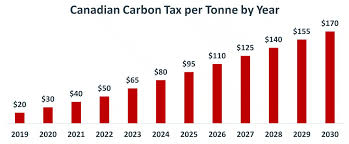The Impact of Carbon Tax on Gas Prices in Canada

Introduction
Canada’s carbon tax has become a critical part of the country’s strategy to combat climate change. As policymakers strive to reduce greenhouse gas emissions, the implications of this tax on everyday costs, particularly gas prices, have garnered significant attention from consumers and industries alike. Understanding the dynamics of carbon pricing is essential for Canadians as it directly influences their budget and lifestyle choices.
Carbon Tax Overview
The carbon tax in Canada is designed to encourage businesses and individuals to reduce their carbon footprint by levying a fee on fossil fuels based on their carbon content. Initiated in 2019, the tax started at C$20 per tonne of carbon emissions, gradually increasing to C$50 by 2022. The federal government has outlined plans for further increases, with the aim of reaching C$170 per tonne by 2030.
Effects on Gas Prices
With the carbon tax in place, the costs of gasoline have seen noticeable increases. According to recent analysis by the Canadian Taxpayers Federation, the carbon tax contributed approximately 11 cents per litre to the price of gas as of 2023. This increase poses challenges for Canadian consumers, particularly those in rural areas who rely heavily on vehicles for commuting and transportation.
Consumer Responses
In response to rising gas prices fueled by the carbon tax, many Canadians have begun exploring alternative transportation options, such as public transit, carpooling, or even investing in electric vehicles. Public sentiment is mixed, with some supporting the environmental benefits of reducing carbon emissions, while others are concerned about the financial impact on households already grappling with inflation and rising living costs.
Implications for Future Policies
As the federal government moves closer to its C$170 per tonne target, further increases in gas prices are expected. This may prompt additional policy measures aimed at alleviating the burden on consumers, such as subsidies for electric vehicles or investments in public transit infrastructure. The future of the carbon tax remains a topic of debate among politicians, economists, and citizens, with ongoing discussions about finding a balance between environmental sustainability and economic viability.
Conclusion
The carbon tax represents a significant shift in Canada’s approach to energy and climate policy. While its primary goal is to mitigate climate change impacts, it undoubtedly influences gas prices and shapes consumer behavior. Canadians must stay informed about these developments, as they will play a crucial role in shaping the economic landscape and guiding future policy decisions. As the nation aims toward greener energy solutions, the implications of the carbon tax will remain a vital conversation among all Canadians.









